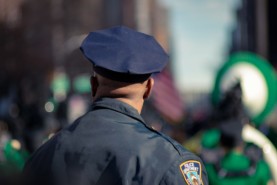Posted on 18 Jun 2020
The violence sparking the protests in the United States and elsewhere around the world has prompted widespread calls to overhaul policing. This could have a major impact on local policing. But it goes further – this is an opportunity for a revolution in how we tackle organized crime globally.
Just a few weeks ago in the United States, people were sheltering in their homes as the global pandemic swept across American cities. Now they are taking to the streets in their thousands to protest against the unlawful killing of George Floyd by four police officers in Minneapolis. Ironically, protests against police brutality and in support of racial equality were met by a significant show of force by police, much of it caught on video.
COVID-19 has not only affected vulnerable people in our societies, it also has exposed vulnerabilities in our societies. One is the relationship between police and the citizens they serve. In these unprecedented times, the COVID-19 crisis has obliged police to enforce unusual laws. This requires a degree of discretion, common sense and proportionality. Yet, from India to Kenya, there have been reports of citizens being beaten for breaking curfews, rubber bullets fired at people waiting in supermarket queues, and even of police shooting people found outside. Statistics from New York, the US epicentre of the virus in March and April, show 93 per cent of pandemic-related arrests involved people of colour. Police are under strain – not least at the risk of their own well-being – to get their priorities right, and to conduct themselves in a manner that maintains public approval and respect.
Safety first
Back in the 1820s, Robert Peel – the father of policing in Britain – said, ‘The police are the public and the public are the police.’ His words emphasize how the ability of the police to perform their duties is dependent upon public approval and public respect. In many societies today, that social contract is in shreds. One reason for this is that the objectives of policing – to achieve public safety – have sometimes been lost as bureaucratic incentives (equipment, wider mandates, growing budgets) have diverted focus from stated objectives.
Although the police are public citizens, like anyone else, they are also the face of government. Therefore, their demeanour affects how well society complies with guidance, requests or instructions from state authorities. Draconian implementation of lockdowns or heavy-handed responses to public protests damage the reputation of both the police and the state. It can also lead to an escalating spiral of violence and disorder that strains the ability of emergency services to cope, and widens the gap between citizens and the police. In such cases, police cause more harm, becoming part of the problem, and not the solution.
This is a boon for authoritarian regimes that are more interested in order than law. But it is a blow to open societies where police are accountable to elected officials and are supposed to protect, rather than attack, the public.
The death of George Floyd has triggered an international tsunami of protests in support of how ‘black lives matter’, and has led to calls for fundamental reforms of the police. For this international movement, there are a disproportionate number of deaths of unarmed black men at the hands of white police officers, excessive militarization of the police and an inefficient use of public resources, prompting demands to defund the police.
Although it is America that is in the spotlight right now, these challenges are common in other countries, particularly in Africa, Asia and Latin America. In too many parts of the world, there is little contact between the police and the communities that they are supposed to protect and serve. This disconnect is often exploited by criminal groups offering ‘protection’, which in reality usually amounts to extortion. When illicit markets generate billions of dollars in profits, the incentives for police themselves to become ‘paid protectors’ for illicit markets is enormous.
Oppressed poor, untouchable elites
When crime festers in neglected, marginalized neighbourhoods, the state response is often to send in heavily armed police or even the military. As we have shown elsewhere, this usually leads to deaths, arrests and greater public resentment towards the state – but the cycle of violence brings little change to criminal markets, or the structural factors that create vulnerability in marginalized communities.
It is a pattern in which the poor remain downtrodden and petty criminals are thrown in jail; meanwhile, criminal elites continue to benefit from the lucrative illicit markets for goods and services. The middlemen, the controllers and kingpins of crime, move seamlessly between the underworld and the upperworld. They are seldom convicted, with prisons everywhere full of the lower level users and functionaries of criminal markets, many of whom have few economic alternatives to illicit activities. These people are easy pickings for the police and are often apprehended to meet policing arrest targets.
While the latest protests are undoubtedly drawing public attention to the failure of policing in the streets, much bigger problems lurk in the shadows. Thanks to globalization, over the past 30 years, organized crime has gone global and reached macro-economic proportions. Criminal networks have become as efficient and profitable as multinational corporations. In some countries, the criminal, business and political elites rub shoulders and grease one another’s palms.
So, while the COVID-19 crisis and the social unrest that has followed have brought into sharper focus shortcomings of police services that are dealing with old challenges, like community policing and crowd control, a closer examination also exposes the weakness of criminal-justice systems to deal with more contemporary and global challenges like organized crime.
Therefore, let us use this crisis as an opportunity to take a fresh look at policing and implement much needed, radical changes, not only in our communities but also in relation to global illicit markets and networks. At the local and transnational levels, many of the remedies will be similar.
Remedies for reform
First, strengthen local resilience. City streets are not war zones that need to be dominated: they are public spaces that need to be made safe. What is needed is more local input from communities themselves. We should be deploying policymakers, city planners, entrepreneurs and architects into run-down neighbourhoods, and not more police. And there should be a stronger focus, including greater investment, on increasing resilience within communities – to shift attention to fighting crime rather than fighting the police. If police are de-funded, some of the money should go into building safer and more sustainable communities: investing in schools, healthcare (including drug treatment), infrastructure, training and innovation labs, and public spaces. And discussions, including about budgets, should involve a wide cross-section of people from the affected communities, as they have the biggest stake in the stability and prosperity of where they live.
Secondly, de-militarize crime fighting. Some of the starkest images seen during the past few weeks have been of heavily armed police and soldiers enforcing curfews or breaking up protests. This is symptomatic of a trend over the past 20 years (particularly in relation to counter-terrorism and the war on drugs) of a heavy-handed state response that employs military tactics and strategies to control the public. There is little evidence to support the success of such an expensive and robust approach. It is time to de-militarize and defund such activities.
Thirdly, reduce vulnerability. Crime prospers where there is socio-economic hardship, and underdevelopment is a magnet for crime. To break this vicious circle, it is vital to target development assistance to poor communities that are hotspots of crime. This includes regions where drugs are grown, as well as vulnerable locations that are either the weakest links along trafficking routes, or the breeding grounds for the foot soldiers of criminal groups.
Next, defund the criminal elite. The money generated by illicit activity buys power, influence and impunity, and is laundered in the private sector or offshored in tax havens. The rage that has been mounting on the streets is partly engendered by a sense of injustice that it is inevitably the weakest and the powerless who are targeted, while the kleptocrats, criminals and their cohorts seem untouchable, and continue to milk the system. It is time to defund the criminals and their enablers. This means closing down offshore havens, cracking down on money laundering and other informal financial flows, and working with the private sector (particularly the financial services and real estate industries) to make sure they understand who their clients really are.
Remove the umbrella of political protection. It is worth recalling, particularly at this time when police are being so heavily criticized, that many law-enforcement officers do a highly professional job. Although corruption, human-rights abuses and unethical behaviour are endemic in many police forces, there are plenty of officers who do the right thing, often at risk to their own lives. However, the good work of investigators is often undone by weak prosecution or political interference. Therefore, it is time to invest in special investigative units to deal with serious organized crime, and give them – as well as prosecutors and anti-corruption officials – the independence and resources that they need to do their jobs within the framework of the rule of law. This would denude criminal groups of the political umbrella that protects them.
Finally, use your intelligence. Criminal groups have become highly adept at exploiting opportunities. A better understanding of criminal markets, actors and networks would increase the ability of law-enforcement agencies to target responses. Placing illicit markets and those who control them within the wider ambit of the political economy will also expose the reality that, in many cases, law enforcement is only one element of what must be a multifaceted response to criminal markets. This means bringing an array of tools to bear – diplomatic, economic, social, as well as enforcement – and coordinating them effectively.
Reform globally, not just locally
The debates on transforming policing at local level that are now taking place in the United States and elsewhere need to be about what the police can do effectively, and what can be done by others, as well as how these actions can be coordinated. And this logic applies as much to transnational organized crime as to local policing. The message should be heeded within the creaking multilateral institutions dealing with organized crime.
Both the COVID-19 pandemic and the brutal actions of a group of policemen in Minneapolis have ignited serious debates about latent problems with policing at the local and global levels. Many of the techniques used by police today are not fit for purpose. For example, the methods currently used to fight organized crime would be familiar to cops from the 1970s and, meanwhile, the criminals have taken advantage of all of the benefits of the last 30 years of technological development and globalization. At a time when there are widespread calls for police reform, the focus should also be on global, and not just local, responses to crime.
Recent events serve as an urgent reminder that the primary aim of the police is to provide safe and thriving communities. We have lost sight of that aim at local and global levels. It is time for rethinking what police should be doing in our neighbourhoods, and more sophisticated and multi-sectoral responses to organized crime at the global level. The responses must engage a wider range of stakeholders, for legitimacy and effectiveness, provide incentives that pull people into legal activities, and make crime a much riskier and less profitable business for the untouchables at the top.
Photo ©Jack Finnigan



